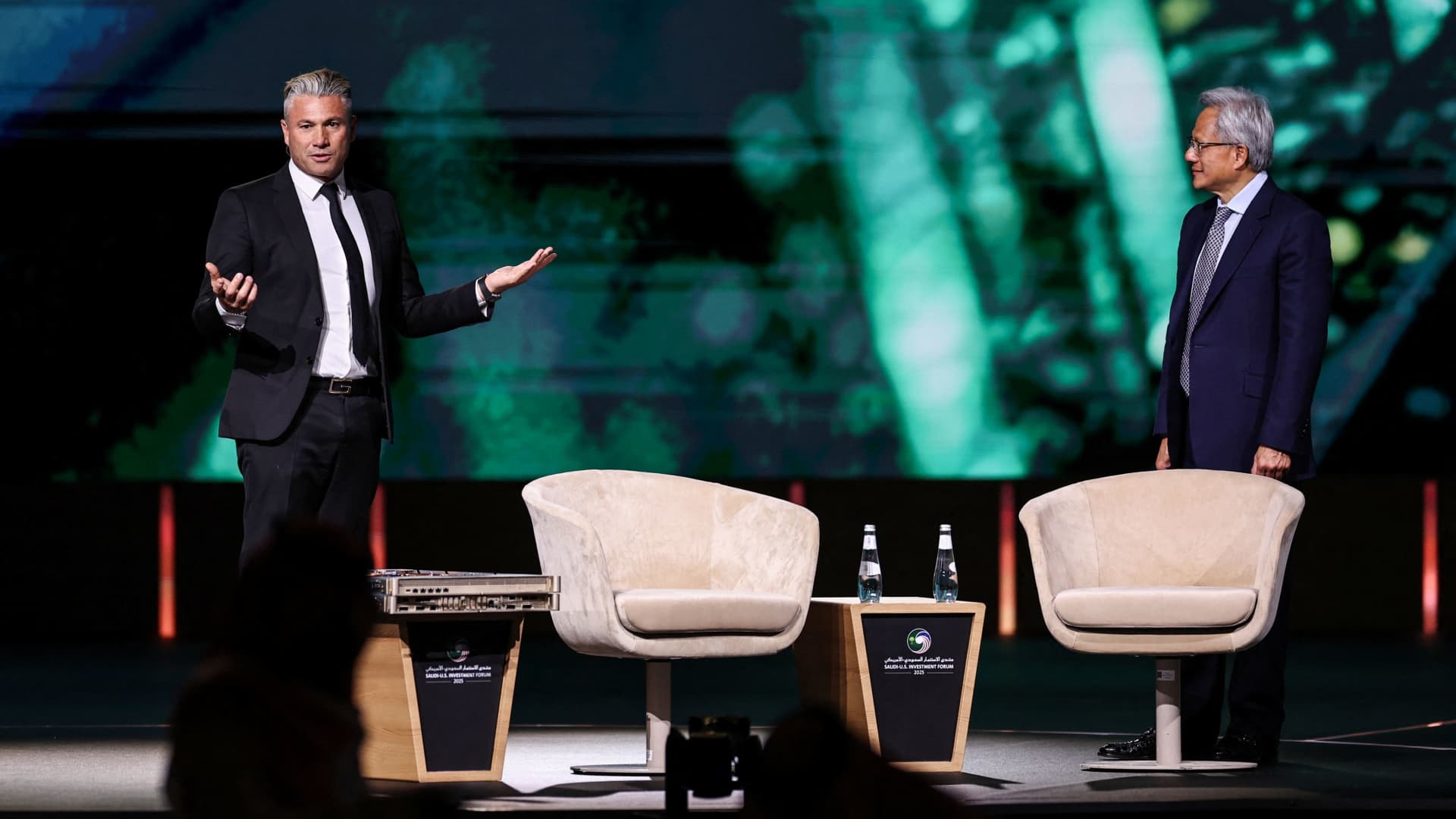The Strategic Importance of Nvidia’s AI Chip Deal with Saudi Arabia
A New Dawn in the Middle East’s AI Landscape
In a move that signals a seismic shift in the global AI landscape, Nvidia has announced the sale of over 18,000 of its cutting-edge AI chips to Humain, a Saudi Arabian company. This deal, unveiled by Nvidia CEO Jensen Huang, is not just a commercial transaction but a strategic maneuver that underscores the Middle East’s growing significance in the AI race. The chips, destined to power a 500-megawatt data center in Saudi Arabia, represent a bold step towards the region’s AI ambitions and a testament to the strategic importance of the Middle East in the global AI ecosystem.
The Middle East’s AI Ambitions
Diversifying Economies
The Gulf states, including Saudi Arabia and the UAE, have been aggressively investing in AI technology. This push is driven by a desire to diversify their economies and reduce dependence on oil, a finite resource. The purchase of Nvidia’s AI chips by state-owned entities in the region is a clear indication of their commitment to this vision. These chips are not just tools for technological advancement but catalysts for economic transformation.
The Global AI Race
The world’s leading tech companies are scrambling to secure these advanced AI chips, and the Middle East is no exception. The UAE, for instance, has also secured access to thousands of Nvidia chips, intensifying the competition in the region. This race is not just about acquiring technology but about securing a place at the forefront of the AI revolution.
Nvidia’s Role in the AI Ecosystem
Nvidia’s AI chips are in high demand due to their unparalleled computational power and efficiency. These chips are the backbone of the most advanced AI models, including large language models (LLMs) and other AI services. Nvidia’s partnership with Humain is a strategic move to establish Saudi Arabia as a global leader in AI, GPU cloud computing, and digital transformation. This collaboration is set to drive innovation and growth in the region, positioning Saudi Arabia as a key player in the global AI ecosystem.
Navigating U.S. Export Controls
The U.S. government has imposed restrictions on the export of these advanced AI chips, citing concerns about their potential access by China, Saudi Arabia’s top trading partner. However, efforts are underway to meet U.S. security requirements, which could expedite the acquisition of Nvidia’s H200 chips. These chips, used in advanced platforms like OpenAI’s GPT-4, are expected to significantly boost Saudi Arabia’s AI capabilities. The U.S. government’s consideration of allowing the export of these chips to Saudi Arabia is a delicate balancing act between national security concerns and the economic benefits of AI development.
A Strategic Partnership
The partnership between Humain and Nvidia is a strategic alignment with Saudi Arabia’s vision to become a global AI leader. By leveraging Nvidia’s platforms and expertise, the two organizations aim to establish Saudi Arabia as a hub for AI innovation. This collaboration is expected to enhance Saudi Arabia’s AI capabilities, create new economic opportunities, and positively impact market sentiment in the Middle East and Asia. The deal is a clear indication of the region’s AI ambitions and its potential to drive innovation and growth.
Powering the Future
The acquisition of Nvidia’s advanced AI chips is a significant step towards achieving Saudi Arabia’s AI ambitions. These chips will power a 500-megawatt data center, supporting the development of cutting-edge AI technologies. This investment is part of a broader strategy to diversify the Saudi economy and reduce dependence on oil. The partnership with Nvidia will create new opportunities for innovation and growth, positioning Saudi Arabia as a key player in the global AI landscape.
The Path Forward
The strategic partnership between Nvidia and Humain marks a significant milestone in the global AI race. The acquisition of Nvidia’s advanced AI chips by Saudi Arabia is a clear indication of the country’s commitment to becoming a global AI leader. This move will not only enhance Saudi Arabia’s AI capabilities but also create new opportunities for economic growth and diversification. The future of AI in Saudi Arabia looks promising, with the potential to drive innovation and growth in the region. As the Middle East continues to invest in AI, it is poised to play a pivotal role in shaping the global AI landscape. The region’s AI ambitions are not just about technological advancement but about securing a place at the forefront of the AI revolution. With strategic partnerships and a clear vision, the Middle East is set to become a global leader in AI, driving innovation and growth for years to come.
Conclusion: A Promising Future
The strategic partnership between Nvidia and Humain is more than just a business deal; it is a bold step towards a future where the Middle East is a global leader in AI. The acquisition of Nvidia’s advanced AI chips is a testament to Saudi Arabia’s commitment to innovation and economic diversification. As the region continues to invest in AI, it is poised to drive significant advancements in technology and create new opportunities for growth. The future of AI in the Middle East is bright, and with strategic partnerships and a clear vision, the region is set to play a pivotal role in shaping the global AI landscape. The world is watching, and the Middle East is ready to take center stage in the AI revolution.

